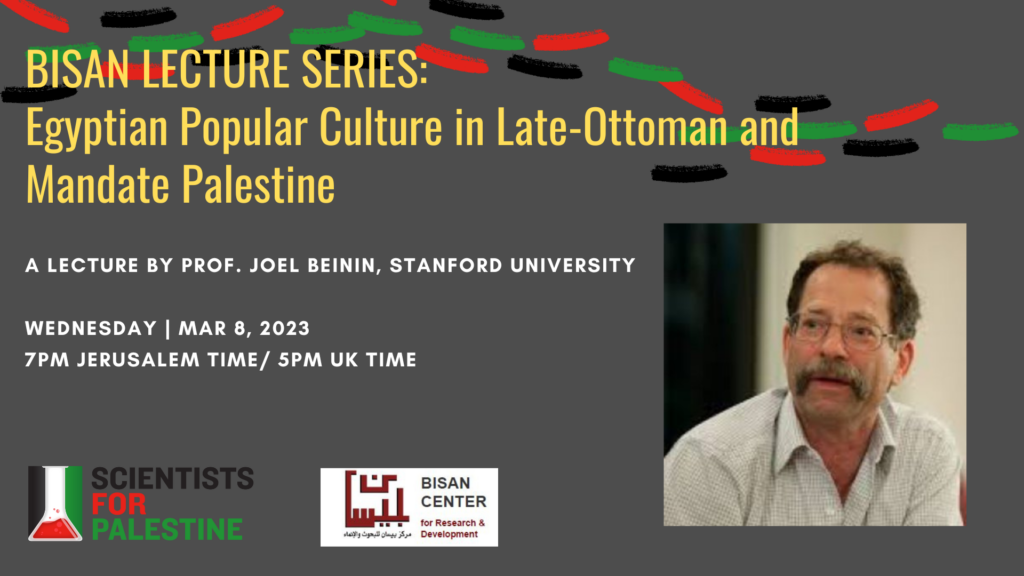Join us on Wednesday, Mar 8th for a webinar by Joel Beinin!

Recording, Lecture Slides and Playlist available
Prof. Joel Beinin, Stanford University
Title: Egyptian Popular Culture in Late-Ottoman and Mandate Palestine
Summary: Joel Beinin, professor emeritus of history at Stanford University, delivered the Bisan Lecture of March 8th. Beinin’s subject was the strong presence of Egyptian popular culture in Palestine during the first half of the 20th Century. That was a time when new forms of mass culture developed with the advent of the new technology of audio recordings. That was also a time when Cairo emerged as the cultural capital of the entire Eastern Arab (Mashreq) region, of which Palestine was an integral part. Beinin traced the history of the repeated tours in Palestine of the most celebrated Egyptian artists of the period, including the giants of Egyptian popular music, the singers Umm Kulthum and Muhammad Abdel Wahhab, the stage actors Naguib al-Rihani and Yusuf Wahbi, who regularly toured Palestine with their respective theatre companies, along with many other prominent Cairo-based performers such as Zaki Murad, Badi‘a Masabni, Farid al-Atrash, Asmahan, and Layla Murad. Beinin recounted moments and events when these artists and their accompanying troupes were warmly received and performed to wide acclaim in Palestine, notably in Jaffa, Haifa, and Jerusalem.
Abstract: During the late Ottoman and British Mandate periods, Palestine was an integral component of the audience for the new forms of “colloquial mass culture” that emerged in Cairo as it became the cultural capital of the entire Eastern Arab (Mashreq) region. Egyptian artists featured in the new technology of audio recordings like Shaykh Salama Hijazi and Munira al-Mahdiyya, the touring theatre troupes of Naguib al-Rihani and Yusuf Wahbi and the Egyptian National Theater, and the giants of interwar Egyptian popular music – Umm Kulthum and Muhammad Abdel Wahhab – regularly appeared and were warmly received in Palestine.
However, popular Egyptian performers did not come to Palestine to affirm or reinforce its Arabism. They came because they earned substantial fees for their performances and because they had large and loyal audiences there, some of whom were Jews. And they performed in both Arab and Jewish-owned venues. The presence of Arabs and Jews at concerts or in movie theaters did not necessarily mean that they liked each other or that their families and friends approved of such associations. Neither did they dislike each other as a matter of principle.
This ambiguous legacy was manifested in the political uproar over the naming of streets in honor of Umm Kulthum and Abdel Wahhab in Jerusalem, Ramle, and Haifa in 2020. This was not an indicator of Arab-Jewish coexistence under Israeli rule as myopic leftists and centrists imagined. It was not an indication that music can overcome any political divide as self-styled apolitical musicians professed. And it was certainly not represent a conciliation with terrorism, as hysterical rightwing agitators proclaimed. It was, in the present as it was in the past, a phenomenon in which spectators and fans read themselves into the meanings of the work of artists they witnessed, heard, and most importantly, admired and enjoyed.
Biographical Sketch: Joel Beinin
Joel Beinin is the Donald J. McLachlan Professor of History and Professor of Middle East History, Emeritus at Stanford University. His research and writing focus on the social and cultural history and political economy of modern Egypt, Palestine, and Israel, and the Palestinian-Israeli conflict. He taught at Stanford from 1983 to 2019 with a hiatus as Director of Middle East Studies and Professor of History at the American University in Cairo from 2006 to 2008. In 2001-02 he served as president of the Middle East Studies Association of North America.
He has written or edited twelve books, most recently: A Critical Political Economy of the Modern Middle East (Stanford University Press, 2021); co-edited with Bassam Haddad and Sherene Seikaly; The Independent Left in Israel, 1967-1993: A Collection in Memory of Noam Kaminer [in Hebrew] (Mevaseret Tziyon: November Books, 2019); co-edited with Carmel Kaminer, Matan Kaminer, Smadar Nehab Kaminer, and others; Workers and Thieves: Labor Movements and Popular Uprisings in Tunisia and Egypt (Stanford University Press, 2016).
